Debbie Young's Blog, page 18
May 12, 2021
Party Animals
In my Young By Name column in the May 2021 edition of the Tetbury Advertiser , I was anticipating my kittens’ post-lockdown lives
 The perfect lockdown companions
The perfect lockdown companionsLike all pets acquired in the pandemic, our two kittens, Bingo and Bertie, are starting to notice big changes in their little world. Until now they’ve led a very sheltered life. Born and raised in a Cats Protection League pen, the only humans they saw before they came to live with us were their foster parents.
Joining a household of three people – my husband, my daughter and I – more than doubled their human acquaintance.
They are used to seeing more cats than humans. When they first came to live with us a couple of days before first lockdown, our calico cat Dorothy was already in residence. Three neighbours’ cats, with wanton disregard for social distancing guidelines, treat our garden as their territory.
Open HouseAs far as Bingo and Bertie are concerned, cats rule our cottage.
We daily prove our subservience by leaping up from our armchairs to open the French doors whenever they want to go in or out of the garden. (And yes, they do have a catflap.) We spend more hours observing their antics than watching television.
Their friends sneak into our house for a snack when they think we’re not around. Often, when we are in another room with Dorothy, Bertie and Bingo, we hear crunching noises in the kitchen, followed by the rattle of the catflap.
Up to Tricks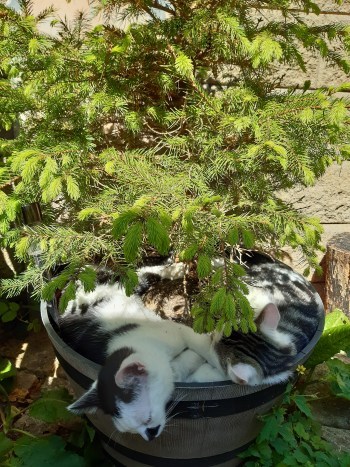 In their early days, the kittens moved so fast it was hard to get a photo that was not blurred – until they were asleep.
In their early days, the kittens moved so fast it was hard to get a photo that was not blurred – until they were asleep.We’re wondering what they’ll get up to when, post lockdown, they have the house to themselves. It seems Bingo is already planning ahead for a more independent life. The brains of the trio, he has for some time been paying a great deal of attention to the bolt at the bottom of the French doors that give onto the patio. If his paws had opposable thumbs, he’d have flung the doors open by now.
He’s also been practising his party tricks. The other day, startled by Dorothy jumping out of the wardrobe, he executed a perfect back flip. If my daughter hadn’t been with me as witness, I wouldn’t have believed my eyes. He landed so neatly on all four paws that I wanted to hold up cards saying “10.0”, like the judges used to do for ice-skaters. I have never seen a cat turn 360 degrees from a standing start. The only animal I’ve seen perform that trick was battery-powered, a toy dog my grandfather bought from a street trader.
Bertie is equally athletic, easily jumping four or five feet into the air when pursuing an airborne insect. In relation to his height, this is about the equivalent to me leaping from the doorstep onto our cottage roof.
Of course, like all good pet owners, we’re conscious that animals acquired during lockdown may suffer separation anxiety as normal life returns. But part of me can’t help wondering whether for our cats the first day they have the house to themselves, the party will just be starting.
Like to read the whole of the Tetbury Advertiser for free online? Click here.
In Other News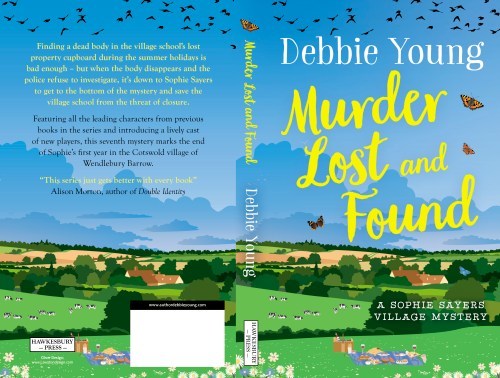 Sneak preview of the paperback cover for my new novel, out on 23rd May
Sneak preview of the paperback cover for my new novel, out on 23rd MayWhile we’re on the subject of cats, fans of Sophie Sayers’ black kitten, Blossom, will be pleased to know that she puts in an appearance in Murder Lost and Found, the new Sophie Sayers Village Mystery which launches on Sunday 23rd May.
[image error]Blossom plays a pivotal role in this little noveletteSince Sophie adopted Blossom in Springtime for Murder (in which the main storyline revolves around cats), any new story I write about Wendlebury Barrow would not feel complete without Blossom. She plays a critical part in my novelette, The Clutch of Eggs, too.
All of my fiction books have seasonal themes, and I’m glad to be launching a summery book at this time of year. It doesn’t always work out so neatly – I had to launch the Christmassy Stranger at St Bride’s in midsummer, because that was when it was ready! And during the coming summer I will be writing the wintry Scandal at St Bride’s, the third in the St Bride’s School series, which begins in January. Sometimes I feel so out of synch with the seasons that I might as well be working in the fashion industry.
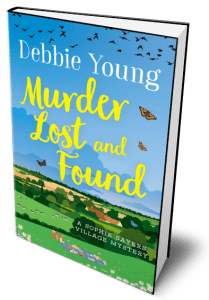 Pre-order the ebook
of
Murder Lost and Found
to have it land on your ereading device on launch day (23rd May).Order the paperback from Amazon from launch day onwards (link not yet available), or ask your local bookshop to order it in for you, quoting ISBN 9781911223719. Within the next couple of weeks, they should be able to order it from their usual stockist – if not, they are welcome to contact me and I’ll be happy to supply them direct.
Pre-order the ebook
of
Murder Lost and Found
to have it land on your ereading device on launch day (23rd May).Order the paperback from Amazon from launch day onwards (link not yet available), or ask your local bookshop to order it in for you, quoting ISBN 9781911223719. Within the next couple of weeks, they should be able to order it from their usual stockist – if not, they are welcome to contact me and I’ll be happy to supply them direct.
May 6, 2021
Trust Me, I’m a Bell Ringer
In this month’s issue of the Hawkesbury Parish News, I share cautionary tales about buying and selling our family cars.
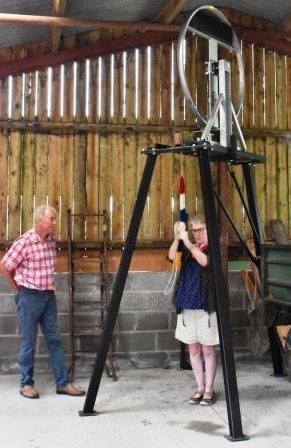 Learning the basics of bell ringing on the dumb bell, under the guidance of St Mary’s Tower Master Colin Dixon, who is also Editor of the Hawkesbury Parish News (Photo: Laura Young)
Learning the basics of bell ringing on the dumb bell, under the guidance of St Mary’s Tower Master Colin Dixon, who is also Editor of the Hawkesbury Parish News (Photo: Laura Young)When buying or selling a car privately, it pays to be wary of would-be scammers, so when last month we decided to part with a vehicle we no longer needed, I braced myself to fend off shady dealers.
Sure enough, the first offer was what I’ve since discovered to be a classic case of overpayment scam:
Via email, the buyer offers your asking price without even viewing the car and asks to pay online, in this case by Paypal.You then receive an email confirming his payment – but of a higher amount.The buyer emails again, regretting his silly mistake and asking you to refund the difference direct to his bank account.Then he disappears without trace, taking your refund with him, while his original payment to you bounces.Suspicious when his supposed proof of payment went straight into my spam box, I called his bluff, rebuffing and blocking him without paying a penny.
The next offer came from a much more plausible source: a lady who told me she lives in Chipping Sodbury and works for Marks and Spencer.
What could be more respectable? I thought, before realising that was exactly what a scammer might expect me to think.
Last year I came close to committing an unintentional but plausible scam myself. At a dealer near Wells, we viewed and made an offer for a car, and I set up a bank transfer to pay for it. When I dropped my husband off to collect it and drive it home, the salesman was pleased to see us. “We’ve received your money, thank you,” he beamed, but his face fell when he double-checked. “Oh no, that’s from a different Young.”
“But I’ve paid from my Marks and Spencer bank account, and they told me it would be in your account by 5pm,” I replied. It was already gone five. “But I must dash – I’ve got to get back for bell ringing practice.”
Even though the money had not arrived by the time the dealership closed for the evening, the trusting young salesman let my husband drive the new car away. His nerve almost failed at the last minute.
As he handed over the keys, he said: “You realise if the payment doesn’t come through by the morning, I’ll have to report you for car theft.”
When I checked my bank account the next morning, the money still had not left my account. When I phoned to ask why, I was told it had been stopped it as part of a routine check for money-laundering. The transfer eventually went through, but it cost the salesman a sleepless night.
Only with hindsight did I realise my bell ringing practice would have made a great cover story for a scammer, second only to wearing a clerical collar. Or indeed living in Chipping Sodbury and working for Marks and Spencer.
Fortunately my Marks and Spencer lady turned out to be as genuine as my bell ringing practice, but I fear I may have put the car dealer off bell ringers for life.
A Note about the New Bells of St Mary’s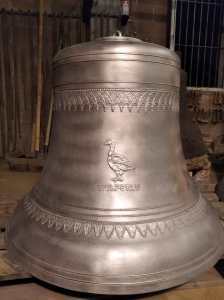 Fresh from the mould, our new Wulfstan bell, named after our former parish priest, St Wulfstan
Fresh from the mould, our new Wulfstan bell, named after our former parish priest, St WulfstanThis month, our local parish church of St Mary the Virgin will take delivery of a wonderful set of eight new bells, which have been cast especially for us, after a mammoth fundraising effort by the Friends of St Mary’s. I’m on the Friends’ committee, and I also run their website.
For more information about this exciting and historic event in the life of our village, visit www.friendsofstmaryshawkesbury.com, where over the coming weeks we will be sharing the story of their blessing, installation and inauguration.
More About Money-Laundering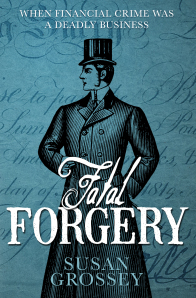 Constable Sam Plank’s investigations into historical financial fraud start with this first novel in Susan Grossey’s excellent series
Constable Sam Plank’s investigations into historical financial fraud start with this first novel in Susan Grossey’s excellent seriesI’m lucky to have a friend who is an expert on money-laundering – or rather on the prevention of money-laundering. If I ever have any qualms about the trustworthiness of a deal, I know I can count on Susan Grossey for advice. She is the author of a series of books and numerous articles on the topic, which have also inspired her to write an excellent series of mystery novels about historical financial crime. It’s kind of heartening to know that dodgy deals pre-date the digital age and online banking! I highly recommend her Constable Sam Plank series, which kicks off with Fatal Forgery – read more about Susan’s books and where to buy theme on her website: https://susangrossey.wordpress.com/
In Other News The ebook is now available for pre-order and the paperback will be out on 23rd May.
The ebook is now available for pre-order and the paperback will be out on 23rd May.Meanwhile I’m gearing up to launch my next novel, Murder Lost and Found, which is due to be published on 23rd May – a date I chose as auspicious because it will be my daughter’s eighteenth birthday! One of the themes of this story, which kicks off when a dead body is found in the village school’s lost property cupboard, is the deceptiveness of eyewitness evidence, a dilemma encapsulated by the quote from psychologist Elizabeth Loftus in Psychology Today:
“Eyewitnesses who point their finger at innocent defendants are not liars, for they genuinely believe in the truth of their testimony. That’s the frightening part – the truly horrifying idea that what we think we know, what we believe with all our hearts, is not necessarily the truth.”
I’ve had great fun writing this story, the seventh Sophie Sayers Village Mystery, which sees Sophie gain new confidence as she reaches the end of her first year in the village of Wendlebury Barrow. I’ve introduced some fun new characters too, including a trio of mischievous workmen and Anastasia, a beautiful young intern that to Sophie’s horror Hector has appointed while she was away on holiday.
PRE-ORDER THE EBOOK from the retailer of your choice here: www.books2read.com/MurderLostAndFound.The paperback will be available from the launch date – more news on that to follow soon.
April 29, 2021
Travels with my Book #4: To Alexandria in Egypt with Carol Cooper
 Today Carol Cooper tells us about her third novel, The Girls from Alexandria
Today Carol Cooper tells us about her third novel, The Girls from AlexandriaToday I’m delighted to welcome Carol Cooper to tell us the story behind her wonderful new novel, The Girls from Alexandria, set in – you guessed it – Alexandria!
Just to be clear, this is the original Alexandria in Egypt, not any of the towns by the same name in the USA or elsewhere – named for its founder, Alexander the Great, once home to one of the Seven Wonders of the Ancient World and now the largest city on the Mediterranean. It has long been a cosmopolitan melting pot of cultures, which Carol vividly describes in her novel.
That Carol is a past master at creating a sense of place is evidenced by her two previous novels, both set in London, One Night at the Jacaranda and Hampstead Fever.
I’m a Londoner myself, despite living in the Cotswolds for the last thirty years, and those two novels vividly evoke my native city. I was therefore looking forward to reading her latest novel celebrating the exotic setting of her childhood, and I snapped up the ebook as soon as it came out and really enjoyed it. The paperback and audio are also now available – find out how to order at the end of the interview. Now, let’s meet Carol…
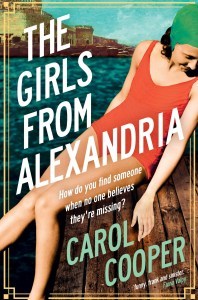 Hello, Carol, and welcome! Can you please start off by telling us a little more about the setting of your new novel.
Hello, Carol, and welcome! Can you please start off by telling us a little more about the setting of your new novel.
The Girls from Alexandria is set mostly in Alexandria – Egypt, that is, and not, as some Americans think, the one in Virginia. The novel has two timelines, and the present-day action mostly takes place in London.
Please briefly describe what kind of book it is.
It’s a hybrid between historical fiction and a modern mystery. Seventy-year-old Nadia’s brain is failing and she’s going to end up in a care home unless she can find her sister Simone who’s her last remaining relative. But Simone went missing from the family home in Alexandria 50 years ago. And all Nadia has to go on is a few old postcards and her own jumbled memories of Egypt.
What makes this place such a great setting for your story?
As I knew it, Alexandria was a vibrant hub of commerce, culture, and leisure. Many different nationalities and ethnicities contributed to its success, and all lived side by side in a peaceful patchwork. The city itself is very atmospheric. On the Corniche (the waterfront promenade), little boys sell necklaces threaded with jasmine and vendors grill corn over a makeshift charcoal grill, while a gentle breeze off the Mediterranean gives Alex a near-perfect climate – unlike Cairo which, as any Alexandrians will tell you, is inferior in every way.
Yet all was not well in the 1950s, and the era that was so comfortable for many was on the cliff edge of change.
All this made it the perfect backdrop for Nadia’s story.
What is your relationship with Alexandria, and how much of your life have you spent there?
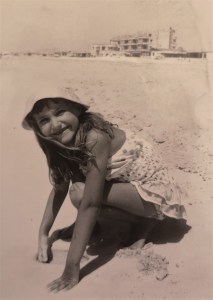 Carol Cooper spent her formative years in Alexandria
Carol Cooper spent her formative years in AlexandriaI was born in London and taken to Alexandria at the age of eight months. I lived there non-stop for eight years, then on and off for another couple of years. While it’s not a huge slice of my life, those are formative years. My mother’s side of the family is Arab. Our ancestors were Syrian and Lebanese, and came to settle in Alexandria about 100 years before I was born.
Egypt was a safe haven for many, so that was a common scenario in the Middle East. However, although we were Egyptian, some still considered us outsiders. It was an easy decision to give my principal character Nadia and her family exactly the same ethnicity, and for Nadia to search for the meaning of ‘home’ as much as for her missing sister.
What is special about the people native to Alexandria?
People from Alexandria may actually come from all over the world, so they might be, or have been at some point, Greek, Italian, Lebanese, French, British, Armenian, Turkish, Russian, Swiss, or any number of other nationalities, as well as a mix of creeds.
An Alexandrian is a citizen of the world, and everyone we knew spoke at least three languages.
You were hardly Alexandrian if you didn’t leap from one language to another, mid-sentence or not, use your hands to help make your point, and talk so softly that you could be heard in Peru.
What are your top tips for any readers planning to travel to the setting of your book?
Unfortunately many magnificent period buildings, including ornate French and Italianate splendours, are no more. To house a booming population, new blocks have sprouted everywhere, without regard for heritage or planning regulations. Some of them collapse into rubble just as quickly.
But there’s still a lot to see. The Bibliotheca Alexandrina is a marvel. Completed in 2002, it is both a tribute to the old Library of Alexandria, and a spectacular new centre for culture and study.
 Alexandria’s ancient catacombs are not to be missed
Alexandria’s ancient catacombs are not to be missedThe catacombs at Kom el Shoqafa are definitely worth a visit. These are tombs in Roman, Greek, and Egyptian styles. Some statues are Egyptian but have Roman clothes and hairdos. I like to think this embodies the city’s cosmopolitan spirit.
Pompey’s Pillar is also a must. It was really built to honour Roman emperor Diocletian, but legend has it that someone misread the inscription at the base of the pillar.
Anyone travelling to Egypt should stick to the tourist trail or they could get into serious trouble with the police. Visitors should also be careful what they take photos of – no government buildings, for a start.
However you can still walk along the Corniche and take in the view. At sunset, the sky turns every shade of pink, purple, and red. As the last slice of the sun sinks, you might catch sight of a green flash. That’s when you can make a wish, but be quick. There’s only a brief moment before the sun drops like a rock into the sea and the sky turns dark.
Are there any other authors’ books with the same setting that you’d like to recommend?
Anyone interested in Alexandria may already know Lawrence Durrell’s Alexandria Quartet. I can also recommend translations of Neguib Mahfouz’s novel Hotel Miramar, and Robert Solé’s Hôtel Mahrajane and The Alexandria Semaphore. Finally there’s a special place in my heart for André Aciman’s vivid memoir Out of Egypt.
Carol, thank you so much for taking us to Alexandria today – now let’s share an extract of your new novel.
EXTRACT from The Girls from Alexandria
Alexandria, June 1953
Zouzou strolled up and down, chewing Chiclets and wiggling her bottom in yet another swimsuit. She was part Italian, part Egyptian, and maybe part French or Austrian. In Alex, it was normal for everyone to be part something, with all the parts jumbled up.
‘Don’t stare,’ Simone hissed.
It was impossible not to stare. Zouzou was unbelievably old, maybe thirty, and she chewed gum with a wide painted mouth like the film stars at the Rialto.
When I next looked up from my sandcastle, Mother was deep in conversation with her sisters and Father had nodded off. Simone’s sketch pad was still under the parasol, but she wasn’t. She wasn’t by the water’s edge either. Blood drained from my face. In fact, it drained from my entire body.
I jumped up and bellowed, ‘Simone!’
Several boys splashed in the water nearby, fighting over an inflatable mattress. Simone was nowhere to be seen. I felt sick.
‘What is it, chérie?’ Mother asked.
‘Simone’s gone. Simone!’ I yelled again.
Mother was up, spinning her head around. ‘When did you last see her?’
‘I don’t know. Just a moment ago. Simone!’ It was when Zouzou went by, wasn’t it? My heart was beating all over the place except, it seemed, in the one spot where it was meant to beat.
‘There’s a shaweesh up on the Corniche,’ Mother told Father. ‘We should ask him.’
Yes, I thought. A policeman might be able to find a missing girl. Unless she’d already drowned.
Father rushed off to find the shaweesh while Abdou hitched up his long galabeyya so he could race up and down the sand in search of Simone. I silently promised I would give St Anthony twenty piasters if we found my sister.
TO FIND OUT MORE ABOUT CAROL COOPERVisit Carol’s website at www.drcarolcooper.com.
I also recommend following her blog, www.pillsandpillowtalk.com, which is always well-written and entertaining, whether writing about issues of the day, medical matters (she is also a medical doctor and medical ournalist), or about her books and writing life. Her latest post is “10 Things You Didn’t Know About Alexandria“.
TO ORDER THE GIRLS FROM ALEXANDRIA
The Girls from Alexandria is now available in ebook, paperback, audiobook download for Audible, and audio CDs.
Ebook:https://www.amazon.co.uk/Girls-Alexandria-someone-believes-missing-ebook/dp/B08PFYN6CX/ Paperback:
https://www.amazon.co.uk/Girls-Alexandria-Carol-Cooper/dp/1913099709/Audiobook download (for Audible):
https://www.amazon.co.uk/The-Girls-from-Alexandria/dp/B091FX3171/Audio CDs:
https://www.amazon.co.uk/Girls-Alexandria-Carol-Cooper/dp/1004035632/
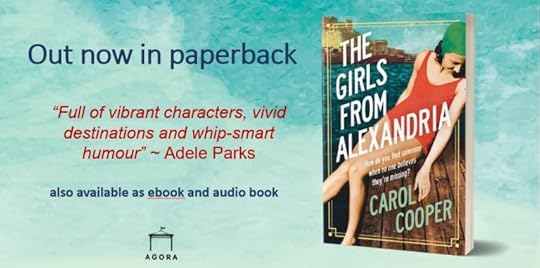
NEXT MONTH:
Lucienne Boyce takes us from 18th century England to a mythical country far away in To the Fair Land
PREVIOUS POSTS IN THIS SERIES:
To Fiji with B M AllsoppTo the Caribbean with Helen HollickTo Europe and Roma Nova with Alison MortonOr take a trip to the Cotswolds any time, through the pages of my own novels and novelettes!
April 22, 2021
Thank You for the Days
In my column for the April issue of the Hawkesbury Parish News , I was musing about changing the clocks for British Summer Time and comparing it to losing whole days when the world switched from the Julian calendar to the Gregorian calendar – which, astonishingly, happened in different years in various countries around the world
 (Photo by DAVIDCOHEN on Unsplash)
(Photo by DAVIDCOHEN on Unsplash)If you begrudged losing an hour at the end of March, think yourself lucky. If you’d been alive in 1752, you’d have lost eleven days.
That’s when it became clear that the Julian calendar we’d been using since the days of Julius Caesar was an inaccurate measure of a solar year, ie how long it takes the earth to go round the sun. The only way to realign the calendar with astronomical events such as the spring equinox was to skip forward a number of days. The Gregorian calendar, introduced by Pope Gregory XIII in 1582, provided a new system that we still use today.
How many days you sprang forward depended on how quickly your country switched to the new system.
Early adopters France, Italy, Poland, Portugal and Spain sacrificed 10 days of 1582, whereas countries leaving it until the twentieth century, such as Russia, Greece and Turkey, lost 13.
When England took the plunge in 1752, we missed 11 days, the government decreeing that Wednesday 2nd September would be followed by Thursday 14th September. You can’t help but feel sorry for the people born between 3rd and 13th, missing out on their birthdays that year.
The 11 abolished days also account for why the British tax year starts on 6 April. Historically, rents and debts fell due on the four quarter days of the Christian calendar:
Lady Day (25 March)Midsummer Day (June 24)Michaelmas (29 September)Christmas Day (25 December)Lady Day had always been the start of the tax year. When the government realised that switching to the Gregorian calendar would cost them 11 days of tax revenue, they simply extended the tax year, making it end on 5 April.
 And the time now is forget-me-not past daisy.
And the time now is forget-me-not past daisy.Sweden intended a more gradual approach to switching calendars, planning to simply cancel leap year days from 1700 to 1740. After errors prevented that happening in 1704 and 1708, they postponed their plan, designating 1712 a double leap year to restore the Julian calendar. This move created a one-off opportunity to be born or married on 30 February, thus never being able to celebrate your birthday or your wedding anniversary on the right day again. (They eventually went Gregorian in 1753.)
So while we may feel that we’ve missed out on many things during the last year due to Covid-19 restrictions, at least we still had the right number of days, even if it was often hard to tell them apart.
(With apologies to The Kinks and Kirsty McColl for the title,
inspired by their wonderful song).
IN OTHER NEWS
COUNTDOWN TO A NEW SOPHIE SAYERS VILLAGE MYSTERY!
 Just 33 days to go (from the date of this blog post) until Murder Lost and Found is unleashed on the world – the seventh Sophie Sayers Village Mystery.
Just 33 days to go (from the date of this blog post) until Murder Lost and Found is unleashed on the world – the seventh Sophie Sayers Village Mystery.
In this story, set in the school summer holidays, Sophie finds a dead body in the school lost property cupboard – but her plans to investigate are scuppered when it promptly disappears!
Join Sophie, Hector, Billy, Tommy and their fellow villagers – and meet some new characters too, including an irreverent trio of workmen building a new playground and a new member of staff at Hector’s House!
Murder Lost and Found was originally intended to complete the series of seven novels, seeing Sophie through her first year in the village, and running the course of a village year from one summer to the next. However, due to popular demand, there will be at least an eighth novel in the series, set in the Scottish Highlands, and further spin-offs, including more in the Tales from Wendlebury Barrow series of quick-read novelettes featuring Sophie and friends.
PRE-ORDER YOUR COPY HERE (EBOOK)
(Paperback will be available from launch date of 23rd May)
April 14, 2021
My Favourite Writing Advice Quotes
 As I prepare my talk for Wrexham Carnival of Words next week, offering answers to FAQs (the most frequently asked questions) about writing, I’ve been revisiting some of my favourite advice from writers I admire. I hope you’ll enjoy it too, whether you’re a writer or a reader or indeed both.
As I prepare my talk for Wrexham Carnival of Words next week, offering answers to FAQs (the most frequently asked questions) about writing, I’ve been revisiting some of my favourite advice from writers I admire. I hope you’ll enjoy it too, whether you’re a writer or a reader or indeed both.
In my teens, I read the complete works of George Orwell for the extended essay that formed part of my International Baccalaureat at Frankfurt International School. His politics, his integrity and his rules of writing have stayed with me ever since.
Never use a metaphor, simile, or other figure of speech which you are used to seeing in print.Never use a long word where a short one will do.If it is possible to cut a word out, always cut it out.Never use the passive where you can use the active.Never use a foreign phrase, a scientific word, or a jargon word if you can think of an everyday English equivalent.Break any of these rules sooner than say anything outright barbarous.While I don’t follow Orwell’s rules blindly – for example, I will use a long word if it feels more natural than the short equivalent – I think any aspiring writer would do well to pin them over their writing desk.
Just Write, says Ray Bradbury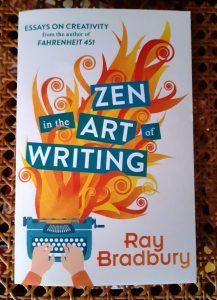 Fear of breaking rules should not deter the would-be writer from putting pen to paper or fingers to keyboard and just getting on with it. Many writers, especially when they’re starting out, spend far too long dithering, thinking about writing, talking about writing, and admonishing themselves for not writing at all. They should listen to the hugely prolific (and entirely wonderful) Ray Bradbury:
Fear of breaking rules should not deter the would-be writer from putting pen to paper or fingers to keyboard and just getting on with it. Many writers, especially when they’re starting out, spend far too long dithering, thinking about writing, talking about writing, and admonishing themselves for not writing at all. They should listen to the hugely prolific (and entirely wonderful) Ray Bradbury:
Stephen King on ConcisionJust write every day of your life. Read intensely. Then see what happens. Most of my friends who are put on that diet have very pleasant careers.
Possibly the most useful English lesson I learned at school was the art of précis. I’m amazed it isn’t taught more widely.
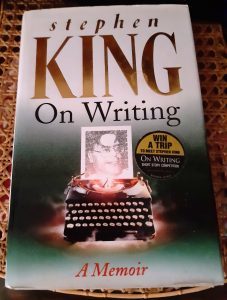 I’m naturally garrulous in conversation and with the written word. Knowing how to cut out superfluous words without losing meaning was therefore invaluable in my early careers as a journalist and a PR, when I had to write articles to fit precisely into a given space or to match a specific word count. Ruthlessly editing down other people’s text, or pieces I’d written on clients’ products that weren’t close to my heart (eg cat litter, frozen peas, drainpipes), was great practice for when I began to focus on writing fiction.
I’m naturally garrulous in conversation and with the written word. Knowing how to cut out superfluous words without losing meaning was therefore invaluable in my early careers as a journalist and a PR, when I had to write articles to fit precisely into a given space or to match a specific word count. Ruthlessly editing down other people’s text, or pieces I’d written on clients’ products that weren’t close to my heart (eg cat litter, frozen peas, drainpipes), was great practice for when I began to focus on writing fiction.
Novice writers are often disbelieving when I tell them it’s possible to cut 10%, 20% or even more from something they’ve written – and return pleasantly surprised to find that not only did they manage it, but that the edited piece is more powerful. Stephen King, whose memoir On Writing should be on every writer’s shelf of reference books, sums up the process well:
More Murderous Recommendations from Sir Arthur Quiller-CouchWhen your story is ready for rewrite, cut it to the bone. Get rid of every ounce of excess fat. This is going to hurt: revising a story down to the bare essentials is always a little like murdering children, but it must be done.
Stephen King is not the only writer who invokes murder. Although the next piece of advice has been attributed to many authors over the years, it was author and critic Sir Arthur Quiller-Couch who originally coined the phrase in On the Art of Writing in 1916:
Whenever you feel an impulse to perpetrate a piece of exceptionally fine writing, obey it – wholeheartedly – and delete it before sending your manuscript to the press. Murder your darlings.
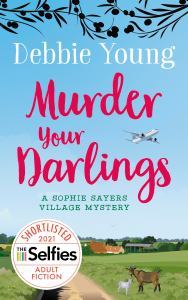 I couldn’t resist using this famous writing tip as a title for one of my mystery novels
I couldn’t resist using this famous writing tip as a title for one of my mystery novelsI love this particular tip so much that I made it the playful title of my mystery story set at a writers’ retreat, published last year. It now feels like a lucky charm, as Murder Your Darlings has now made it to the shortlist of six novels for adults shortlisted for The Selfies Award, given by publishing industry news service Bookbrunch for the best self-published books in the UK.
A more succinct version of Quiller-Couch’s recommendation comes from Elmore Leonard:
If it sounds like writing, I rewrite it.
I like to think George Orwell would approve!
Above All Else, Read!But probably my favourite piece of advice to writers, and the one that irks me most when aspiring writers ignore it, is simply to read. I have no patience with those who say they can’t spare the time. Would you trust a chef who never tasted food? Over to Samuel Johnson:
The greatest part of a writer’s time is spent reading, in order to write; a man will turn over half a library to make one book.
Without wishing to sound smug, in the last twenty-four hours, I’ve read part of all of these:
From the Oxford University Press’s “Very Short Introductions” series, American History by Paul S BoyerA collection of classic children’s stories, Mary’s Plain’s Omnibus by Gwynned RaeThe Secret of Chimneys by Agatha ChristieThe Times newspaper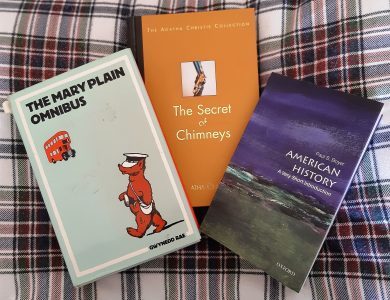 All in a day’s reading for meJoin Me at the Wrexham Carnival of Words (online this year)
All in a day’s reading for meJoin Me at the Wrexham Carnival of Words (online this year)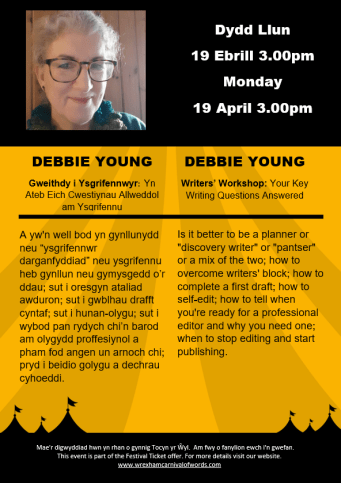 My talk will be only in English, despite the Welsh on the poster – as Wrexham’s in Wales, they provide info in both languages
My talk will be only in English, despite the Welsh on the poster – as Wrexham’s in Wales, they provide info in both languagesIf you’d like to hear my own writing advice at Wrexham Carnival of Words, which is being held online from 17-24 April, you’ll need to buy a ticket – but the good news is that just £15 will gain you a pass to the entire festival. Visit their website to find out more about the huge array of events on offer and to book your ticket now: www.wrexhamcarnivalofwords.com
For the Wrexham AudienceI’ll be sharing with delegates the following list of recommended further reading…
The Art of Writing Made Simple – Geoffrey AshePolish Your Fiction & Writing in a Nutshell – Jessica BellSelf-editing for Self-publishers – Richard BradburnZen in the Art of Writing – Ray BradburyBecoming a Writer – Dorothea BrandeWrite Every Day – Helena HalmeOn Writing – Stephen KingNail Your Novel series – Roz MorrisUse the Power of Feedback to Write a Better Book – Belinda PollardPunctuation without Tears – Dominic Selwood… and this list of recommended membership organisations for writers:
Alliance of Independent Authors (affiliate link) – a global nonprofit organisation, for which I’m UK AmbassadorFictionfire – run by my friend Lorna Fergusson, the most amazing writing coach and editorJericho Writers – the leading online writers’ club for which I’ll soon be teaching a course (more news on that soon)The Society of Authors – the trade union for UK writers; similar organisations exist in most countriesDo you have a favourite quote about writing or a book for writers to recommend? I’d love to hear it, so please feel free to leave a comment.
April 7, 2021
Spring Scales
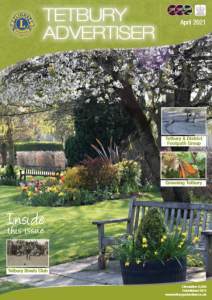 Click the image to read the whole magazine for free online
Click the image to read the whole magazine for free online
In the April issue of the Tetbury Advertiser , I was talking about the weather (as you do…)
Although in the last twelve months the weather has been displaced as our favourite topic of conversation, I’m hoping it will regain that status soon. I’ve been fascinated by the weather from an early age, and not only because my father was a meteorologist in the Royal Navy.
For the Love of Ladybirds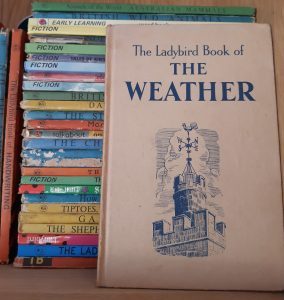 What cemented my interest was borrowing The Ladybird Book of the Weather from our local public library when I was a child. I generally preferred fiction books, but the innate charm of the Ladybird format made non-fiction as appealing as any fairy tale. I couldn’t wait until I got home to read it, so I didn’t. Instead, I read as I walked, looking up at the sky every now and again in hope of spotting a cumulonimbus or a cirrostratus. I loved the language of clouds.
What cemented my interest was borrowing The Ladybird Book of the Weather from our local public library when I was a child. I generally preferred fiction books, but the innate charm of the Ladybird format made non-fiction as appealing as any fairy tale. I couldn’t wait until I got home to read it, so I didn’t. Instead, I read as I walked, looking up at the sky every now and again in hope of spotting a cumulonimbus or a cirrostratus. I loved the language of clouds.
I thought the Beaufort Scale sounded rather grand too. It was the first time I’d come across that name, growing up in a London suburb rather than on a certain Duke’s stomping ground. (Note for readers beyond Tetbury: we are near neighbours of the Duke of Beaufort at his Badminton estate, home of the famous Badminton Horse Trials.) I longed to collect all the numbers in the Beaufort Scale, like stamps, from 0 for Calm (“smoke rises vertically”), demonstrated with a picture of factory chimneys, to 12 for hurricane (“disastrous results”), too awful to merit an illustration. The pictures only went up to Force 10, showing a house blowing over, even though, like the third little pig’s, it was built of brick.
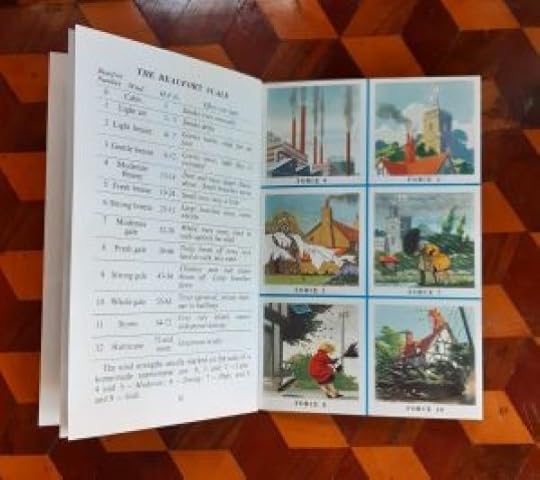
More recently, Ladybird’s rendition of the Beaufort Scale inspired me to invent a new way of measuring the temperature. I call it the Butter Scale, and it’s more reliable than any thermometer.
The Butter Scale0 = The butter will be warmer if you put it in the fridge.
1 = No need to refrigerate the butter, as it will be just as cold in my kitchen.
2 = A hot knife cuts the butter into straight-edged slices, but spreading it is out of the question.
3 = The butter knife lives up to the promise of its name, spreading the butter like, er, butter.
4 = The block of butter develops a sinister gleam.
5 = Send out for kippers – we have butter sauce.
 Still at Butter Scale 2 in the Young household today
Still at Butter Scale 2 in the Young household todayI have only ever experienced Butter Scale 6, the very top of the scale, in my car in high summer, when a foil-wrapped pack of butter fell out of my shopping basket. Half an hour after arriving home, I returned to my car and found it on the front passenger seat. At least, I found the foil packet, which had kept its shape, but when I picked it up, it was completely empty. The butter had not only melted but dispersed into the upholstery, never to be seen again. Forever after, I thought of that car as the Buttermobile.
May April bring us the best spring weather for meeting our friends and relations out of doors, and a Butter scale of 3 for our Hot Cross buns. Happy Easter!
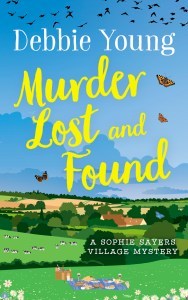 Set during a summer heatwave, this story keeps an eye on the weather!
Set during a summer heatwave, this story keeps an eye on the weather!Speaking of the weather… my next book will include a pivotal scene in which Sophie and Hector, on a picnic on the Cotswold Way, engage in some cloudwatching. One of the key themes of Murder Lost and Found is the unreliability of appearances, and shifting shapes in the clouds triggers an important discussion between them.
Meanwhile here is what I saw in the sky above my parents’ garden in Bristol on Sunday – and, yes, it is actually a vapour trail left by a playful skywriter rather than a chance formation of clouds!
Murder Lost and Found will be launched on 23rd May in both ebook and paperback. Click the link below to preorder the ebook. The paperback will also be available from the launch date.
Pre-order the ebook from the ebook store of your choice
April 4, 2021
Travels with My Books #3: To Roma Nova and Across Europe with Alison Morton
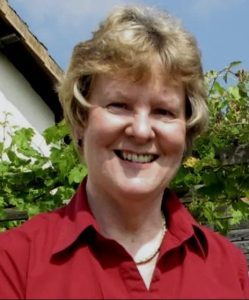 Meet Alison Morton, thriller writer
Meet Alison Morton, thriller writerDespite living in different countries, Alison Morton and I have been friends for almost ten years, each building our own worlds in our series of novels – mine inspired by my real life in the rural Cotswolds, and hers by her passion for Ancient Rome.
Until her most recent novel, a contemporary thriller set in England and France, Alison’s fiction has been based around an alternative vision of how the modern world might have turned out if the Roman Empire had never entirely fallen. Alison’s love of all things Roman is addictive – she’s even inspired me to dust off my schoolgirl Latin and study the language further. (More about that here.)
I’m delighted to welcome Alison to my blog today to tell us about her gripping series of Roman-inspired thrillers, the first of which is Inceptio – and the start of her new contemporary series, which kicks off with Double Identity.
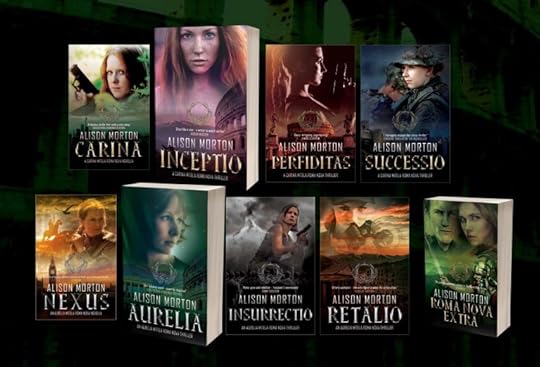 The chronicles of Roma Nova by Alison Morton
The chronicles of Roma Nova by Alison MortonHello, Alison, and welcome! Can you you please set the scene for us by pinpointing Roma Nova’s position on the globe?
Ah, this is a bit of a problem as Roma Nova is an imaginary country! Let’s just say a semi-mountainous area in south central Europe.
Can you please give a brief introduction to the books you’ve set in Roma Nova.
They’re thrillers featuring characters who are descendants of Romans who trekked out of Rome in 395 AD. Given the grim, bandit-infested circumstances of Late Antiquity and Early Medieval Europe they were forced to call on the fighting abilities of everybody, whether man or woman. Although retaining their Roman culture and values, in order to survive they changed their society radically and permanently. More below!
One set of four stories (Inceptio, Carina, Perfiditas and Successio) take place in the present day and revolve around Carina who was brought up in the ‘Eastern United States’, a slightly alternative version of the USA, and who seeks refuge in Roma Nova when an EUS government enforcer is hunting her. Carina’s mother was Roma Novan so it’s logical she flees there. She crosses cultures – never an easy process – but becomes well acclimatised to the more structured and straightforward society and is supported wholeheartedly by her grandmother Aurelia.
Winding back to the late 1960s, when Aurelia was a young Praetorian officer, to the early 1980s when she’s become Roma Nova’s foreign minister, the second set of four books (Aurelia, Nexus, Insurrectio and Retalio) tell the story of Aurelia’s battle with her lifelong enemy, Caius Tellus, and of her part in the great rebellion in 1980s Roma Nova.
Carina and Aurelia, while behaving courageously in their efforts to defend their families and their country, both find that the ‘path to true love’ is both uneven and full of potholes.
What makes this place such a great setting for your stories?
Well, mountains usually mean tough people, and that’s a prime characteristic for the Roma Novans whose society has survived through thick and thin for sixteen centuries. I needed a setting able to shelter and nurture a small group of semi-refugees yet be roomy and varied enough to support an expanding population over time. It had to be fertile and support mixed farming in order to feed everybody, yet defensible from most comers over the centuries. Alpine and semi-alpine landscapes are perfect for this, which meant somewhere in south central Europe like Carinthia/Slovenia was ideal. Alpine areas have well-defined passes and routes through them, perfect for modern transport such as trains and fast roads in the twenty-first century.
 A glimpse of Roma Nova
A glimpse of Roma NovaWhat is your relationship with the setting for your stories and how much of your life have you spent there?
Well, nobody can spend time in Roma Nova, much as they’d like to, but I’ve enjoyed several walking holidays in Switzerland, Northern Italy and Austria so I have a ‘feel’ for this type of landscape, plus as a ‘Roman nut’, I have clambered over most of Roman Europe. Last year, I had a three-week trip to Carinthia and Slovenia planned including a tour of the Julian Alps and a private guided visit to Virunum near Klagenfurt where the founders of Roma Nova met. Sadly, it had to be cancelled due to the Covid pandemic. L But I’ll get there…
What is special about the people native to Roma Nova?
Essentially, they’re direct, hard-working and inventive – pretty much like their ancestors. But just like the original Romans, there are corrupt, greedy and criminal elements. However, there is one outstanding difference to their society from most Western societies – it’s governed by women. This dates from earliest times when daughters and sisters had to heft a sword and fight alongside the men to fend off invaders; there just weren’t enough men in the tiny colony. Older women farmed, traded and ran families and society away from any fighting, and kept the country going. And this became entrenched over the centuries. This gender balancing does upset outsiders though – but that’s their problem, as the Roma Novans say.
 Meet key characters from Alison Morton’s Roma Nova series
Meet key characters from Alison Morton’s Roma Nova series
If your protagonist or other characters come from elsewhere, what challenges do they face dealing with the local people?
Roma Novans are self-reliant but like to co-operate with their neighbours and are courteous with outsiders unless they attack or attempt to hurt Roma Novan interests. Then those outsiders had better watch out. The justice system is strong and fair and the police (vigiles, later called custodes), while polite, don’t stand a lot of nonsense. Roma Novans are generally well-educated and enjoy a very good standard of living. Although they speak both street Latin and the classical version, most Roma Novans are competent in English and Germanic and many know French and Italian, so visitors can be easy.
What are the distinguishing features of Roma Nova in terms of geography, geology, flora, fauna or any other detail you care to mention?
You probably have to like mountains, the smell of pines and snow! But you’ll also find fields of spelt, oats and barley, dairy farms, orchards, vines in sheltered valleys and lots of market gardens along the course of the main river. Of course, in the city you have public buildings, traffic jams, international retail, hospitals, schools, businesses as you would anywhere else, but also a forum, temples and senate house. But yes, the air is fresh and can get bracing up on the high alp pastures in early spring.
What are your top tips for any readers planning to travel to the setting of your book?
Keep an open mind, make sure you have the correct visa and be ready to enjoy a rich cultural life as well as many open air activities like climbing, horse-riding and walking.
“Only in Roma Nova” – name three things that could only exist/happen there!
Games in the amphitheatres (sports competitions rather than fights to the death!)Wonderful public baths on the traditional Roman system (but with very high public health hygiene standards!)People in traditional tunics and sandals especially on warm summer days. The young tend to stay sweltering in tight jeans even in the warmest summers as they think it’s uncool and roll their eyes at their parents. The parents look at them cynically and think, “They’ll learn.”Are there any other authors’ books with the same setting that you’d like to recommend?
Ha! As far as I know, none exist.
Where is your latest book set?
Double Identity is a departure from the imaginary Roma Nova as it’s set in the ‘real world’. Well, as real as any world in fiction is. We switch between London, Brussels, Strasbourg and Poitou in western France. Why? While Conn Iggulden, the distinguished historical fiction writer, was very kindly endorsing Insurrectio, he asked me why I didn’t take one of my heroines into the real world as a European agent, rather than as an ‘alternative’ Roman. I still had three books to write in the Roma Nova series, but how could I resist such a challenge?
I always wanted to write a heroine with a strong connection to Poitou where I live. Mélisende/Mel des Pittones, although she has an English mother, is like most French people very attached to her native region. Her family has deep roots going back centuries; even her name reflects the old Pictones tribe of pre-Roman times.
I’ve spent a fair proportion of my life in France, so I feel thoroughly at home in this setting. Like Mel, when I go back to London, it feels strange as if everything has shifted since I was last there.
But Mel, who has just finished serving in the French Army, has to buckle up and solve her fiancé’s murder which turns into a full-blown conspiracy, whereas I can sit and write peaceably in the clear light and fresh air of Poitou.
Where will your next book be set?
Ah, I have two ‘next books’. How daft is that?
One will be set in Roma Nova, back in the late fourth century when Carina and Aurelia’s founding ancestors meet.The other, which I’m concentrating on at the moment, is another adventure for Mel which centres on Brussels, Poitou, Rome(!) and the mysterious and dangerous Sahel region of Africa where Mel did three tours during her time in the French Army. There is unfinished business there as well as a shadow game and an incredibly dangerous enemy intent on her destruction.EXTRACT from Double Identity
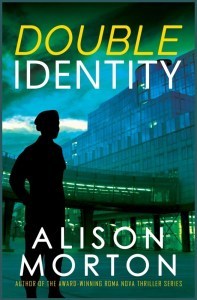 The first in Alison Morton’s new series of contemporary Anglo-French thrillers
The first in Alison Morton’s new series of contemporary Anglo-French thrillers[Mel is in the family home in Poitou, waiting…]
Every day since she’d returned from her assessment with her former unit, Mel had watched for the moment when the hands of the gilded Delettrez clock on the mantelpiece approached half past eleven. It was the third of January now and she’d heard nothing. She went to the kitchen, grabbed the yellow-fobbed key off the row of key hooks and jogged down the drive to the tall gates. Through the gate bars, she’d watch the almost silent electric La Poste van glide up the narrow, metalled road. The same woman had delivered letters and parcels for much of Mel’s life.
This morning, Marie-Anne pulled herself out of her yellow van and brandished a fistful of letters.
‘One for you, Mademoiselle Mélisende. From the minister himself.’
Mel doubted it. She unlatched the gate and pulled it open. After the obligatory kissing of cheeks, and a signature for the letter sent by registered post, Mel took the letter.
République Française, Ministre de l’Intérieur on the upper left edge of the envelope and addressed to Sergent-chef des Pittones. Marie-Anne leant over, excitement plain in her eyes, but Mel slipped it into her pocket.
‘Thank you, Marie-Anne. Don’t bother to put the rest in the box. I’ll take them. Bonne continuation.’ Thus dismissed and disappointed, the postwoman trudged back to her yellow van, executed a perfect three-point turn and disappeared into the fog.
Dodging round Madame Blanc, the cook, as she prepared lunch, Mel made herself a coffee and settled on the pale green sofa in the drawing room. She glanced at the envelope. Somebody must have used the wrong one for her posting letter. It should have come from the defence ministry. Maybe it was some kind of extra security check on re-enlisting. She ripped it open.
ALL ABOUT ALISON MORTONAlison Morton writes award-winning thrillers featuring tough, but compassionate heroines. She blends her deep love of France with six years’ military service and a life of reading crime, historical, adventure and thriller fiction. On the way, she collected a BA in modern languages and an MA in history.
“Grips like a vice – a writer to watch out for” says crime thriller writer Adrian Magson about Roma Nova series starter Inceptio. All six full-length Roma Nova thrillers have won the BRAG Medallion, the prestigious award for indie fiction. Successio, Aurelia and Insurrectio were selected as Historical Novel Society’s Indie Editor’s Choices. Aurelia was a finalist in the 2016 HNS Indie Award. The Bookseller selected Successio as Editor’s Choice in its inaugural indie review.
Alison now lives in Poitou in France, where part of Double Identity is set and is writing a sequel as well as continuing her Roma Nova series.
CONNECT WITH ALISON MORTONConnect with Alison on her thriller site: https://alison-morton.com
Facebook author page: https://www.facebook.com/AlisonMortonAuthor
Twitter: https://twitter.com/alison_morton @alison_morton
Alison’s writing blog: https://alisonmortonauthor.com
Instagram: https://www.instagram.com/alisonmortonauthor/
Goodreads: https://www.goodreads.com/author/show/5783095.Alison_Morton
Alison’s Amazon page: http://Author.to/AlisonMortonAmazon
Newsletter sign-up: http://eepurl.com/ckNeFL
Next month: join Carol Cooper for a trip to Egypt with The Girls from Alexandria – a cracking new novel, hot off the press, that I’m enjoying reading right now!
(To receive each new post in your email inbox, just type your email address in the box beneath the “Follow Blog” button in the sidebar to the right of this post.)
March 25, 2021
Round-up of a Busy Week
Usually I post articles on a single topic on my blog, but this week has been so action-packed that I thought I’d share four news items instead:
one of my books, Murder Your Darlings , was shortlisted for a prestigious award, The SelfiesI was a guest on Joanna Penn’s fabulous Creative Penn podcast, talking about writing cozy mysteriesBBC Radio Gloucestershire‘s Dominic Cotter interviewed me about the new village Books on the Bus schemeI published my latest collection of magazine columns, Still Young By NameIf you’d like to know more about any of these events, read on!
Murder Your Darlings Shortlisted for an Industry Award The second time one of my novels has been shortlisted for The Selfies Award
The second time one of my novels has been shortlisted for The Selfies AwardMy sixth Sophie Sayers Village Mystery, Murder Your Darlings, has been shortlisted for the adult fiction category of the UK Selfies Award, given to the best self-published books in the UK. There are also categories for Children’s Fiction and Memoir/Autobiography.
The Selfies were launched by publishing industry news service BookBrunch in 2018 and are sponsored by Ingram’s award-winning self-publishing platform, IngramSpark®, and supported by the London Book Fair and Nielsen Book.
I’m especially pleased for two reasons:
my first St Bride’s novel, Secrets at St Bride’s , was also shortlisted last yearAlso this year there was a record number of entriesYou can read more about the 2021 shortlist here. The winners will be announced on 20th April.
Interview on the Creative Penn Podcast Joanna Penn at my Hawkesbury Upton Literature Festival, with illustrator and fellow author, Thomas Shepherd (Photo by Jonathan Penn)
Joanna Penn at my Hawkesbury Upton Literature Festival, with illustrator and fellow author, Thomas Shepherd (Photo by Jonathan Penn)A few weeks ago, independent publishing and creativity guru Joanna Penn invited me to be a guest on her hugely popular Creative Penn podcast, and this week the podcast went live.
I’ve known Joanna for a long time, and I first appeared on her show in 2016, talking about bookstores. I often see her at writing and publishing industry events, such as the London Book Fair, and she was a great guest speaker at my Hawkesbury Upton Literature Festival a few years ago. Given that neither of us have been to any such real-life events for over a year, it was especially enjoyable to catch up with her on her podcast.
This time we were talking about how to write cozy mysteries, a genre that has been especially popular during lockdown, providing upbeat, escapist fiction for readers stuck at home. I also shared insights into my writing life.
Although recorded with an audience of writers in mind, I think cozy mystery readers will also find it interesting.
Click here to listen to the podcast on Joanna’s website, where, if you prefer, you can read the transcript.
 My interview is the 540th (!) podcast on Joanna’s show, so if you’d like to hear more podcasts about writing and self-publishing, her blog is a good place to look!Talking about Books on the Bus on BBC Radio Gloucestershire
My interview is the 540th (!) podcast on Joanna’s show, so if you’d like to hear more podcasts about writing and self-publishing, her blog is a good place to look!Talking about Books on the Bus on BBC Radio Gloucestershire Pick up a book when you catch the bus (Photo by Laura Young)
Pick up a book when you catch the bus (Photo by Laura Young)If you enjoyed my post a couple of weeks ago about the new Books on the Bus box that I’ve set up in our village bus shelter, if you are in the UK, you might like to listen to my interview on BBC Radio Gloucestershire with presenter Dominic Cotter, who on Saturday was presenting the Breakfast Show. (I have a feeling you can’t listen outside the UK for licensing reasons.)
Before the pandemic, Dominic was presenting the Lunchtime Show, and my author and books journalist friend Caroline Sanderson and I were regular guests on his Book Club spot. With studio guests not allowed due to Covid restrictions, it was a pleasure to catch up with an interview down the line instead.
You can “listen again” to our conversation 1 hour 41 minutes in to the show, and it lasts about seven minutes. any time before 17th April, via this link: https://www.bbc.co.uk/sounds/play/p099118z New Essay Collection: Still Young By Name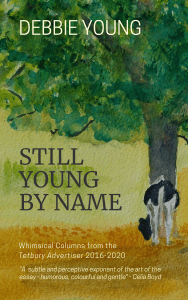 Now available in ebook and paperback
Now available in ebook and paperbackFinally, I’m pleased to announce that my latest collection of magazine columns, Still Young By Name, is now available in ebook and paperback. This is the second volume of columns I’ve written for the Tetbury Advertiser, an award-winning community magazine, which runs my musings on the first page of editorial each month under the heading “Young By Name”.
This book includes whimsical columns from the last five years, reflecting on topical issues of the moment, tempered with anecdotes from my past.
When I reread the columns while I was compiling the book, it struck me what an extraordinary five years 2016-2020 was.
While much in the world had changed, both on our doorstep here in the rural Cotswolds and on the global stage, I also celebrate precious things that stay the same.
Each column – ten per calendar year – is just 500 words long, so this book is easy to dip in and out of whenever you want to be diverted from the pressures of daily life.
The cover image is from a watercolour painting by my father, and although I confess I hesitated before putting a cow’s bottom beside my title, it made me laugh, and I love the calm the whole image exudes. I hope you like it too.
Here are store links in case you’d like to buy it:
For Regular News Updates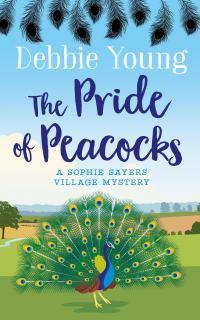 This fun novelette is available exclusively to members of my Readers’ Club.
This fun novelette is available exclusively to members of my Readers’ Club.If you’d like to receive a monthly enewsletter including the latest news on my books and events and also have a chance to enter a free prize draw for something related to my books, please click here to join my Readers’ Club, and you’ll also receive a free download of my novelette, The Pride of Peacocks, in the ebook format of your choice.
In next week’s post, I’ll be talking to Alison Morton, my next guest for my Travels with my Books series.
March 18, 2021
World Class Performers Interview
I am always flattered to be asked to appear on other websites, so when I was invited recently to be a guest on a blog with the grand title of World Class Performers, I couldn’t resist taking time out to answer their questions.
It’s not often that I’m asked to talk so much about my background and my personal life, so I thought I’d share it here in case any of my own blog’s followers might like to read it.
Click the image to read the interview in full.
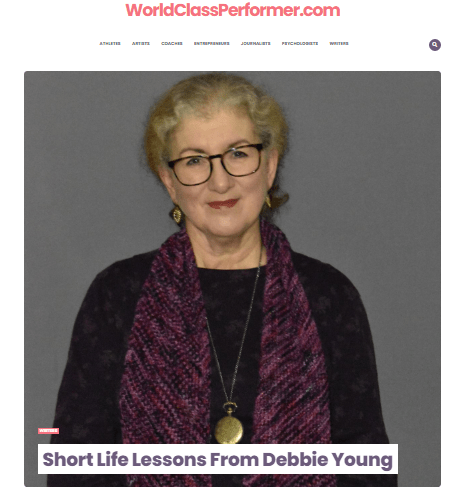 Click the image to read the interview
Click the image to read the interview
March 10, 2021
The Books on the Bus Go Round and Round
In my column for the March 2021 issue of the Hawkesbury Parish News, I was talking all about books – no surprises there, except for the announcement of a new free book resource in the village which I launched on World Book Day, with Councillor John Turner representing Hawkesbury Parish Council. Drum-roll please for “Books on the Bus“…
 Bust of Socrates at the Louvre (By Sting, CC BY-SA 2.5, https://commons.wikimedia.org/w/index.php?curid=96296061)
Bust of Socrates at the Louvre (By Sting, CC BY-SA 2.5, https://commons.wikimedia.org/w/index.php?curid=96296061)Socrates, the ancient Greek philosopher, thought books were conversation killers: monologues that denied readers the chance to engage in discussion. Despite being credited now as one of the founders of Western philosophy, Socrates never wrote a single book. We only know his thoughts through books by Plato and others.
Socrates’ preferred method of exchanging ideas was to hold a conversation while strolling around the walls of Athens. If he were alive today, during lockdown he’d have to resort to Zoom.
In our Zoom-crazy age, in which we expect every public speaker on screen to have a floor-to-ceiling bookshelf behind him, Socrates’ backdrop would be book-free. He’d probably prefer to display a statue of an owl, symbol of Athena, goddess of wisdom, and of his beloved city of Athens, and maybe a Grecian urn or two.
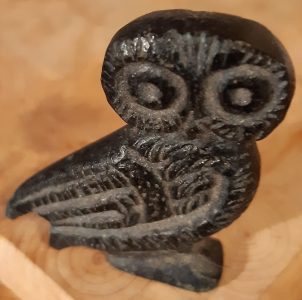 This little owl followed me home from Athens and lives on my desk, the emblem of the Athenae, ancient Greek goddess of wisdomBooks by the Yard
This little owl followed me home from Athens and lives on my desk, the emblem of the Athenae, ancient Greek goddess of wisdomBooks by the YardBut if media pressure persuaded him to join the bookshelf brigade, I know of the perfect solution to fill his bookshelves at one fell swoop: a call to Books by the Yard, a service offered by my favourite second-hand bookshop, The Bookbarn . Based near Wells, The Bookbarn not only sells pre-loved and vintage books individually to callers (though closed to visitors just now due to the pandemic), it also offers a shelf-filling service. Until now, it’s been mainly the preserve of stage set designers and themed pubs and hotels seeking an instant bookish look.
Books on the BusDespite the closure of theatres and hospitality venues during lockdown, their Books by the Yard business has been soaring lately. The reason? Zoom backdrop envy.
If you’re hankering after a new read, there’s no need to travel to The Bookbarn – although once we’re allowed out to play again, it’ll be one of the first places I head for. From Thursday 8th March, for World Book Day, there’ll be a new Books on the Bus box in the bus shelter opposite Hawkesbury Stores. I’ll be keeping the box stocked with books for all ages to give bus passengers something to keep them entertained while waiting for their bus and on their journey.
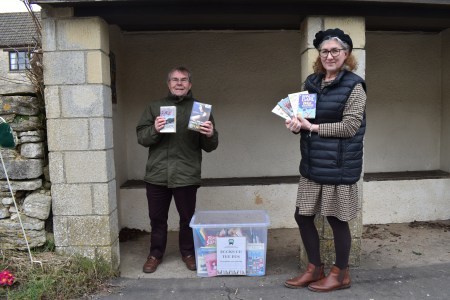 There are books for all ages in the box
There are books for all ages in the box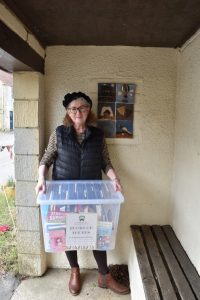 Delivering the new Books on the Bus box to Hawkesbury Upton bus shelter (Photo by Laura Young)
Delivering the new Books on the Bus box to Hawkesbury Upton bus shelter (Photo by Laura Young)You don’t need a bus ticket to borrow from Books on the Bus. As for the Little Free Library on my front wall, you’re welcome to help yourself in passing. Return or keep the books you borrow, as you wish. Donations of more books in good condition will always be appreciated.
Thanks to Hawkesbury Parish Council for providing the plastic box to kick the scheme off, and to the kind donors around the parish who have given me more than enough books to fill the Books on the Bus box initially.
Even so, I don’t think Socrates need worry. There’s no danger that books will ever put a stop to conversation in Hawkesbury.
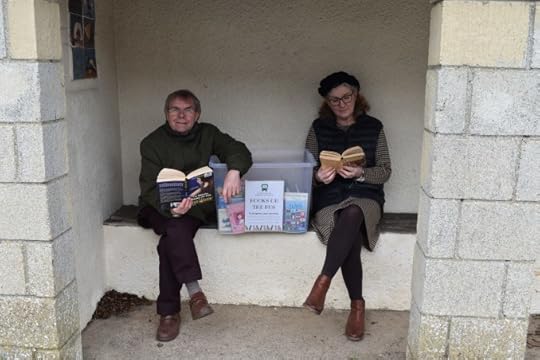 With thanks to Councillor John Turner for coming along to represent the Parish Council (photo by Laura Young)
With thanks to Councillor John Turner for coming along to represent the Parish Council (photo by Laura Young)
IN OTHER NEWS
Writing Workshop (19th April)
If you’re interested in writing, you might like to attend an online event I’m doing on Monday 19th April, I’ll be answering FAQs about writing as part of the Wrexham Carnival of Words. This is just one session of an action-packed festival behind held online because of Covid. You can find out more about the whole programme here: www.wrexhamcarnivalofwords.com)
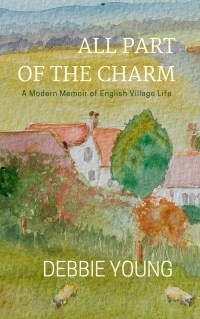
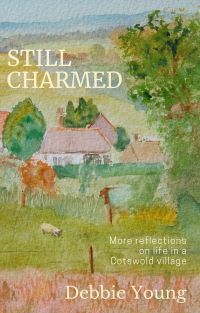
Collected Columns in Book Form
If you’d like to read the archive of my columns for the Hawkesbury Parish News, you might like to know that they’re also available in book form in two volumes. Here are the buying links for the paperbacks and the ebooks:
All Part of the Charm (2010-2015) – order the ebook / order the paperback
Still Charmed (2016-2020): order the ebook / order the paperback



